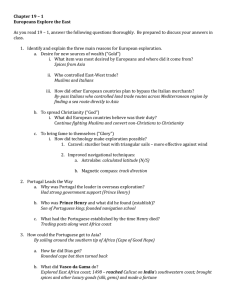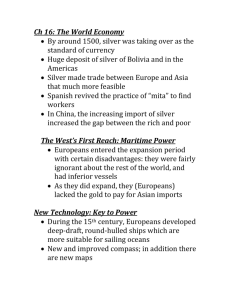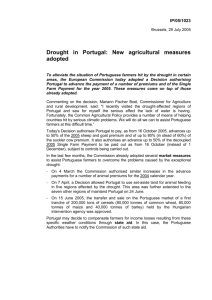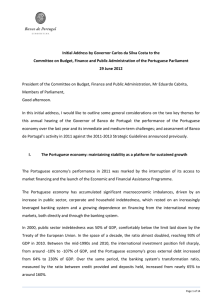Learning from past mistakes: What is the right economic policy for sustained, balanced growth?
advertisement
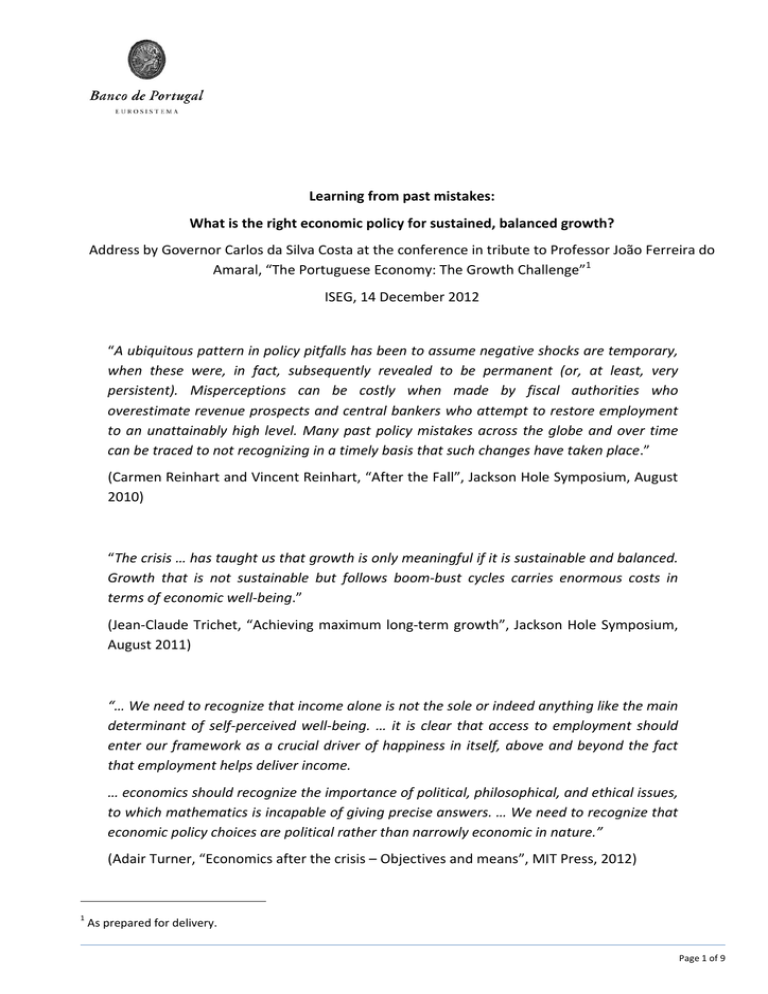
Learning from past mistakes: What is the right economic policy for sustained, balanced growth? Address by Governor Carlos da Silva Costa at the conference in tribute to Professor João Ferreira do Amaral, “The Portuguese Economy: The Growth Challenge”1 ISEG, 14 December 2012 “A ubiquitous pattern in policy pitfalls has been to assume negative shocks are temporary, when these were, in fact, subsequently revealed to be permanent (or, at least, very persistent). Misperceptions can be costly when made by fiscal authorities who overestimate revenue prospects and central bankers who attempt to restore employment to an unattainably high level. Many past policy mistakes across the globe and over time can be traced to not recognizing in a timely basis that such changes have taken place.” (Carmen Reinhart and Vincent Reinhart, “After the Fall”, Jackson Hole Symposium, August 2010) “The crisis … has taught us that growth is only meaningful if it is sustainable and balanced. Growth that is not sustainable but follows boom‐bust cycles carries enormous costs in terms of economic well‐being.” (Jean‐Claude Trichet, “Achieving maximum long‐term growth”, Jackson Hole Symposium, August 2011) “… We need to recognize that income alone is not the sole or indeed anything like the main determinant of self‐perceived well‐being. … it is clear that access to employment should enter our framework as a crucial driver of happiness in itself, above and beyond the fact that employment helps deliver income. … economics should recognize the importance of political, philosophical, and ethical issues, to which mathematics is incapable of giving precise answers. … We need to recognize that economic policy choices are political rather than narrowly economic in nature.” (Adair Turner, “Economics after the crisis – Objectives and means”, MIT Press, 2012) 1 As prepared for delivery. Page 1 of 9 Banco de Portugal EUROSYSTEM Ladies and gentlemen, I would like to start by offering a warm welcome to Professor João Ferreira do Amaral, to whom we are paying a more‐than‐deserved tribute today, and a word of thanks to Professor João Duque for extending an invitation to me to take part in this session. In 2011, for the third time in under four decades, Portugal sought international financial assistance and the Portuguese authorities had to negotiate a demanding economic and financial adjustment programme with the European Union and International Monetary Fund. A year and a half has elapsed since the programme began and we have already made significant progress: the external accounts have adjusted more quickly than expected and there has been sustained improvement in the Treasury's financing conditions. However, signs of public scepticism and erosion of the social support base for the programme are increasingly evident. Economic activity, unemployment and public debt have developed unfavourably, leading many to defend a slow‐down in the pace of budget consolidation and banking sector deleveraging. They point to the risk of a negative spiral between the adjustment process and contracting economic activity, which would lead to the failure of the programme. Others, among them Professor João Ferreira do Amaral, also recommend abandoning the euro and returning Portugal to its own currency. I disagree very strongly with both recommendations. The Portuguese economy's problem is structural and will not be fixed by macroeconomic stabilisation policies. Under the current circumstances, any postponement of the adjustment would involve new financing needs for the public sector or the banking sector, seriously jeopardising the sustainability of indebtedness and resulting in a further loss of credibility. In this context, safeguarding the sustainability of the country's public and external indebtedness is a priority; it is also an active constraint on economic policy's room for manoeuvre and, above all, its consistency over time. Any short‐term deviation will require redoubled efforts to return to the adjustment path and will impose credibility losses that would be difficult to reverse (intertemporal inconsistency is always the biggest trap for economic policy, both monetary and fiscal policy). So priority must be given to making consistent progress at a speed adjusted to the seriousness of the external financial constraint. It involves creating conducive conditions for restoring the sustainability of public finances, strengthening the soundness of the financial system and, as a corollary, strengthening confidence among domestic economic actors and international investors. The idea of restoring a national currency is no solution and would involve extremely high transition costs and complacency over the structural factors behind the Portuguese economy's imbalances. Page 2 of 9 Banco de Portugal EUROSYSTEM We should recall that our currency – and the exchange rate tool it offers – did not save us from the adjustment costs following the financial crises of the late '70s and early '80s. Over that period, the real value of salaries, pensions and savings fell drastically. Money illusion only disguised perceptions of the phenomenon, reducing the political costs of the adjustment. Income and wealth were transferred between private economic actors and between these and the public sector; a transfer that should be quantified, so that today we could have a benchmark for the costs of adjustment under a national currency. Similarly, the devaluation of the escudo restored competitiveness in the short term but not in the long term, which highlights the Portuguese economy's endemic structural weaknesses. The exchange rate devaluation only perpetuated a specialisation pattern based on low salaries. Upon joining the euro area, we lost access to the anaesthetising effect of money illusion. Nominal stability makes transparent the costs associated with different policy options and their distribution. An open, broad‐ranging and informed debate is needed on the development strategy for the Portuguese economy, including its structural weaknesses and the requirements for overcoming these weaknesses. The goal of this debate, for me, is clear: it is to determine the options available for creating a more productive country that creates jobs, in the context of a strengthened economic and monetary union, by taking a long‐term view and remaining fully aware of the constraints affecting economic policy. The theme chosen for this tribute conference, "The Portuguese Economy: The Growth Challenge", thus could not be more timely. The Growth Challenge It is important to remember that the challenge of sustained development reaches beyond Portuguese and European borders, which makes our own adjustment process much harder. In particular, the structural weaknesses of certain European economies that also affect us constitute an additional difficulty for our adjustment process. In fact, the global and European crisis that began in 2007, reflecting an international financial crisis, is above all a reflection of the American and European economies' misalignment with the globalisation process and the related emergence of new competitors in the tradable sector. Therefore, the global and European crisis is also, above all, a reflection of an embryonic structural crisis. We know that structural crises are rarer, deeper and more prolonged than normal cyclical fluctuations. We also know that they involve greater output losses and unemployment. History shows average output losses of 7.5% to 10% in the decade following the outbreak of the crisis. Page 3 of 9 Banco de Portugal EUROSYSTEM We also know that structural crises tend to be perceived as demand crises, not supply crises, and that for this reason they tend to be attacked with macroeconomic stabilisation policies that, by their nature, aim at managing aggregate demand. The inability to identify and address the growing fragilities of the supply of tradables, along with the introduction of demand management policies, have resulted in the accumulation of significant macroeconomic, financial and fiscal imbalances, which lead to: Increased indebtedness of households, companies and the public sector Growing recourse to the wholesale markets for banking sector funding and increased exposure of banks' balance sheets to the public sector The rise of lasting imbalances in the external accounts at global level and within the euro area In various advanced economies, falling unemployment in the non‐tradable sector, fed by growth of public spending and private indebtedness, has disguised the tradable sector's difficulties in coping with greater openness and competition, postponing the economic reconversion imposed by the globalisation process. The figures of the United States are particularly revealing. In the 18 years leading up to the crisis, the US economy created 27 million jobs in net terms, 98 per cent of which were in the non‐tradable sector. Meanwhile in manufacturing, increases in output coincided with increasing unemployment, reflecting the increasing internationalisation of the American tradable sector's production chain. This pattern of unbalanced, unsustainable growth was also found, as we know, in the Portuguese economy and in other euro area economies. For over a decade, corresponding to the so‐called 'Great Moderation', these imbalances were largely ignored both by the policy authorities and by financial market participants. In summary, the abundance of liquidity and the low cost of financing incentivised indebtedness, which in turn fed growth in domestic demand and asset prices. This created the illusion that we had reached a new world order without cyclical fluctuations and with sustainable indebtedness levels that were much higher than those of the past. The crisis has reminded us that the disconnect between supply and demand in tradables resulting from structural insufficiencies on the supply side cannot last indefinitely; it has reminded us also that periods of relatively high growth, followed by sharp or prolonged falls in output and employment levels, have enormous costs in terms of well‐being. The structural dimension of the economic adjustment works every day and ignoring it involves greater costs in the future. Indeed, the impact of income changes on well‐being is asymmetric and depends on the direction of the change: the negative effect on well‐being of a relapse in income tends to be, in absolute terms, Page 4 of 9 Banco de Portugal EUROSYSTEM much more significant than the positive effect on well‐being of marginal increases in income. Thus the crisis has reminded us that stability is of enormous value. Aside from stability, other factors with a significant impact on aggregate well‐being levels should also be taken into account. I refer in particular to phenomena like the increase of social inequalities, very often the result of involuntary unemployment, or negative externalities that may be associated with the growth process, such as deterioration of the environment. We have to be aware of the level of growth, but also of its composition and sustainability. The crisis has exposed the limitations of the conceptual models and the institutional frameworks on which economic policy has been based during the Great Moderation: Monetary policy has largely ignored asset price developments and was incapable of preventing the formation of speculative bubbles Financial regulation and supervision policies have focused on large‐scale liberalisation and have overlooked the systemic risk resulting from the increasing complexity and interdependence between institutions, instruments and markets Fiscal policy was short‐sighted: it failed in its stabilisation role and undermined public finance sustainability over the medium and long term, by not incorporating the expected effects of unfavourable demographic developments Finally, but no less importantly, the institutional framework has proved incapable of promoting adjustment to significant permanent shocks that have affected and still affect the advanced economies, like globalisation, the ageing population, financial innovation and the creation of the European monetary union. (A key consideration of the institutional aspect is the increasingly evident inconsistency between the mainly national jurisdiction of the policies and the increasingly global reach of the markets. This was nowhere more evident than in the case of the euro area. In fact, the inconsistency between retaining national budgetary sovereignty and the key operating principles of the single currency – no bail‐out, no default, no exit – was at the heart of the current sovereign debt crisis) These different facts warrant reflection and profound reform of economic policy‐setting. The different experiences of the economies that today face major difficulties make it clear that a sustained economic growth process will rest on four conditions: 1. 2. 3. 4. Sustainable private and public indebtedness Sustainable external accounts Increasing output Decreasing unemployment Page 5 of 9 Banco de Portugal EUROSYSTEM In fact, Portugal is a case in point, proving that growth based on increasing public and external indebtedness is not sustainable. The case of the United Kingdom is different: it simultaneously had economic growth and falling public and external indebtedness, but in a context of increasing unemployment; in other words, there were productivity gains based on job destruction. Here too the growth process reached its limits. In turn, the examples of Ireland and Spain show how balancing the public finances can be dramatically threatened by irresponsible credit policies directed at the private sector. Finally, the Italian case shows the difficulty in correcting a high level of public debt without economic growth. So what does an economic policy for growth mean? The ultimate, basic objective of economic policy must be to promote sustained and balanced growth – I repeat: sustained and balanced. In other words, growth with fluctuations that are not too extreme and an equitable distribution across countries and social strata. Economic policy‐setting therefore requires a broader, long‐term perspective that explicitly takes into account the constraints resulting from an open economy and demographic trends. The intensification of globalisation sets limits on what domestic economic policy is able to do; those limits depend on the size of the economies, among other things. In turn, demographics limit the sustainability of financing models. Younger countries, as is the case of many emerging economies, benefit from a growth bonus, and thus tend to create excess savings. Conversely, in older countries, economic growth is penalised by demographic developments. This is the case for most European countries. This means that economic debate must be redirected and broadened, going against the national and short‐term bias that has typified it. Indeed, a growth policy goes far beyond an aggregate demand management policy. Demand management policies are only one of the tools at the disposal of the authorities responsible for economic policy. They are designed to deal with cyclical fluctuations, and can be particularly useful when there are hysteresis effects in the labour market or the behaviour of investment. It is a tool that must only be used when the fundamentals of the economy are solid, and in particular, when there is room for manoeuvre in the budget and external accounts. In extreme situations, in which the financing of the economy has become an active constraint, the tool simply becomes unavailable. This is the situation in Portugal, as I have said before. Page 6 of 9 Banco de Portugal EUROSYSTEM Luckily, there are more tools at the disposal of policymakers and they must be used to the full. The appropriate tool depends on a correct diagnosis of the situation. In the case of Portugal, that diagnosis is now clear. The adjustment of the public and private sector balance sheets is a necessary but insufficient condition to help the country escape a prolonged process of relative impoverishment. Sustained growth involves a reallocation of resources and increased capacity in the tradable sector, making the most of the investment in infrastructure made in the past. In Portugal's case, there is significant growth potential in increasing exports, given that Portugal is a relatively closed economy for its size. However, fulfilling that potential is not automatic. It depends on the private sector showing entrepreneurial spirit and the creation of an institutional framework and macroeconomic conditions that promote the quality of investment and attract skilled labour. Critical success factors include simplicity and stability in the tax system, the effectiveness of the justice system and competition policy, the efficiency of the labour market institutions and the stability and solidity of the financial system. Indeed, growth and development result from the accumulation of capital and labour, but also increasingly result from the accumulation of knowledge and economies' capacity to innovate. In turn, these are affected greatly by whether the institutions are high‐quality and fit‐for‐purpose given the country's development level. The introduction of new technologies and production processes in companies will bring significant productivity gains and, as a corollary, strengthen competitiveness; but, it will tend to go hand‐in‐hand with job destruction for a given level of output and demand. To this end we must complete the technological leap, investing in the broadening of markets for existing companies and sectors and fostering new products and activities, which allow the excess labour to be absorbed. We must also invest in training the workforce and preparing it for the companies' needs, through a better alignment between the education system, professional training and research and development. Indeed, we cannot forget that at a time in which scientific and technological paradigms are being broken, it is the capacity to innovate that decides what position a country will hold in the universe of international trade specialisation. Final points The great challenge facing the Portuguese economy today is to adjust the supply in tradables that has become misaligned over the years. That realignment involves a reallocation of resources between the tradable and non‐tradable sectors. For this, it is necessary to foster competitiveness in the tradable sector, which means changing the incentives and the policies that created the misalignment. Page 7 of 9 Banco de Portugal EUROSYSTEM This will affect the existing social balances and models created by the increasing misalignment. This challenge thus goes beyond economics: it affects society. Ultimately, the great challenge facing Portuguese society is to create a social and political consensus on a new economic development model. The new consensus will have to begin by internalising the constraints arising from globalisation and European integration, the demographic trends and the need to restore the Portuguese economy's macroeconomic balances in a sustainable way. The crisis we face and the financial restriction that goes with it do not allow us to delay this debate, which should be comprehensive and informed. Professor João Ferreira do Amaral, to whom we pay tribute today, never shied away over the years from giving his contribution to the debate and from defending his point of view with conviction. I am sure he will continue to do so. The crisis has shown us clearly that economic theory cannot be monolithic nor attempt to explain the real world based on a single, complete and integrated model. No model will manage to capture the complexities and mutations of reality at once. Thus we need to complement the analyses based on sophisticated mathematical models with the learnings from economic history, from psychology and political science; this is to say we have to recreate a more comprehensive vision of the economics science. Public policy should also not be based on the illusion that economics can define the desirable objectives and the means to achieve them with mathematical precision. We must recognise and accept that economic policy choices are political choices and that it is in the political sphere that they must play their part. Allow me a quotation from Lionel Robbins, which seems more up‐to‐date than ever: “There is nothing in economics which relieves us of the obligation to choose.” Thank you very much. References Costa, Carlos (2012), “The Portuguese Economy: Structural saving gap and policy options”, Address at the Inauguration of the Academic Year of the University of Porto School of Economics and Business, 31 October 2012 Douglass C. North, John Joseph Wallis and Barry R. Weingast, 2009, Violence and Social Orders: a Conceptual Framework for Interpreting Recorded Human History, Cambridge University Press Page 8 of 9 Banco de Portugal EUROSYSTEM Gorton, Gary (2012), “Some reflections on the recent financial crisis”, NBER WP 18397, September 2012 Padoa‐Schioppa, Tommaso (2010), “Markets and Government Before, During and After the 2007‐ 20XX Crisis”, The Per Jacobson Lecture, June 27, 2010 Reinhart, Carmen and Vincent Reinhart (2010), “After the Fall”, Jackson Hole Symposium, August 2010 Spence, Michael (2012), “Growth in the postcrisis world”, in In the wake of the crisis – Leading Economists Reassess Economic Policy, edited by Olivier Blanchard et al, MIT Press, 2012 Trichet, Jean‐Claude (2011), “Achieving maximum long‐term growth”, Jackson Hole Symposium, August 2011 Turner, Adair (2012), Economics after the crisis – Objectives and means, MIT Press, 2012) Page 9 of 9


